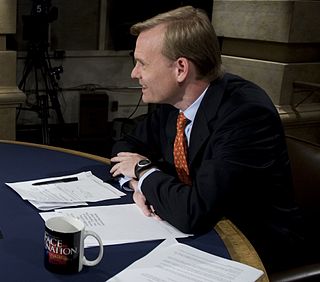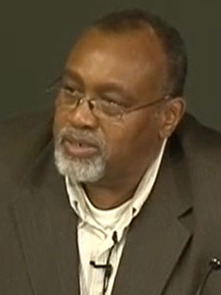A Quote by Chris Hedges
I used to wonder: Is Huxley right or is Orwell right? It turns out they're both right. First you get the new world state and endless diversions as you are disempowered. And then, as we are watching, credit dries up, and the cheap manufactured goods of the consumer society are no longer cheap. Then you get the iron fist of Oceania, of Orwell's 1984.
Related Quotes
Who are these evil ones? In 1984, the evil one was called Goldstein. Orwell was writing a grim parody. But these people running the United States mean what they say. If I were a teacher, I would recommend that all my students very hurriedly read most of Orwell's books, especially 1984 and Animal Farm, because then they'd begin to understand the world we live in.
We are entering a hyperconnected world where every boss now has more access, cheap access to cheap labor, cheap genius, cheap robot, cheap software, and then this world averages over. There is only one answer to that, and that is to get everyone as close as possible to some form of post-secondary education, it could be vocational, it can be liberal arts, it can be science and technology.
What Orwell feared were those who would ban books. What Huxley feared was that there would be no reason to ban a book, for there would be no one who wanted to read one. Orwell feared those who would deprive us of information. Huxley feared those who would give us so much that we would be reduced to passivity and egoism. Orwell feared that the truth would be concealed from us. Huxley feared the truth would be drowned in a sea of irrelevance.
What concerns me most is the horrible degradation our notions of truth, civility, and decency have undergone. Also the way that language has been malformed - we have been overcome with banality and the cynical misuse of language. When a candidate runs a campaign on a series of dog-whistles to bigots, then turns around and talks about "healing the wounds of division," that is right out of Orwell.
Human beings are themselves considered consumer goods to be used and then discarded. We have created a “disposable” culture which is now spreading. It is no longer simply about exploitation and oppression, but something new. Exclusion ultimately has to do with what it means to be a part of the society in which we live; those excluded are no longer society’s underside or its fringes or its disenfranchised – they are no longer even a part of it. The excluded are not the “exploited” but the outcast, the “leftovers”.
The fact that we don't' talk about it, that we don't have a politics in which this question of war and peace can even get onto the table, so that we can open up our Orwell, our 1984, or Animal Farm, or whatever, and read the political text that's being spotted to us on the television right off of the page; the fact that we don't have a politics robust enough to actually debate whether or not we want to be a country permanently at war. That's what keeps me from sleeping at night.































